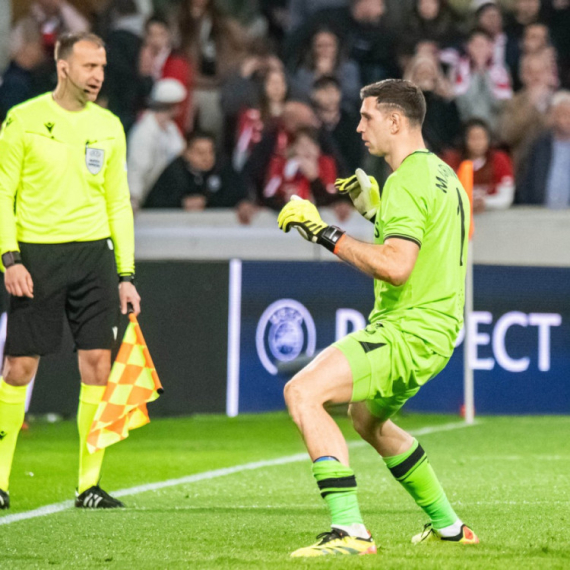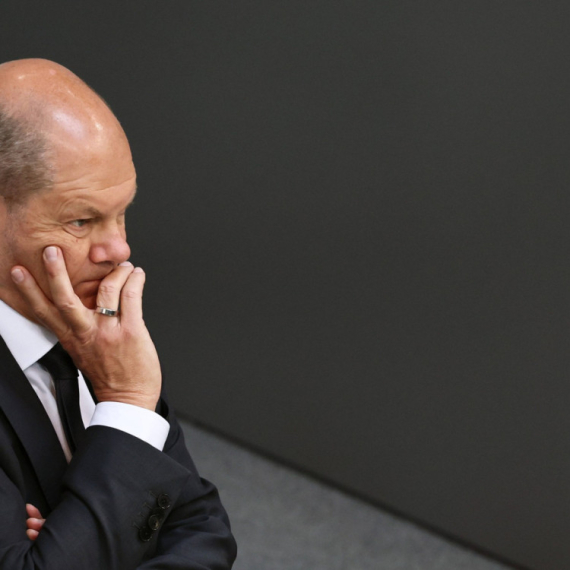Serbia's future "only in EU", says Tadić
Boris Tadić said on Sunday in Belgrade that Serbia's future was "exclusively in the EU", and that "that was the only place to solve the issue of Kosovo".
Sunday, 11.12.2011.
16:25

Boris Tadic said on Sunday in Belgrade that Serbia's future was "exclusively in the EU", and that "that was the only place to solve the issue of Kosovo". The Serbian president and ruling DS party leader also stated that this was "one of the most important national interests". Serbia's future "only in EU", says Tadic In an almost 50-minute address to the gathering of his party's main board, Tadic said "marching toward the European Union" was the country's principal strategic direction. Adding that Serbia "never received such positive appraisal in its process of joining the EU" - as on Friday, when Brussels postponed its decision on making the country a candidate for membership - and while 25 of its member-states thought this status was deserved "by the depth of reforms", there was one reason such outcome did not materialize: "Serbia did not become a candidate for one and only one reason, and that is a lack of solution to the issue of regional representation of Kosovo and Metohija." Speaking about his party's policy of "both Kosovo and the EU", Tadic said that it was "not rigid while giving up on either of its ingredients would be "naive or dangerous". He described policies that wish to give up on the country's legitimate interests as "naive", while those that place Kosovo "above human lives" - as "dangerous". Furthermore, he asked "those who suggest freezing of the conflict with whose help they intend to resolve the conflict", while he wondered how "those who suggest a u-turn" intend to explain to Serbs to Kosovo that they should lose the rights they already have if the Ahtisaari plan were to be accepted. Tadic concluded that Serbia needed "a winning policy and the policy 'both the EU and Kosovo'." Serbia, he continued, has a solution for Kosovo, and that is "to take into consideration the two realities - Serb and (ethnic) Albanian". Tadic stated that former DS leader and Prime Minister Zoran Djindjic, who was assassinated in 2003, "shortly before his assassination came up with a proposal to partition the province", but noted that such a proposal is today being rejected by "big countries". The economic issue is the biggest problem because it solves all other issues, Serbian President and Democratic Party (DS) leader Boris Tadic said Sunday. “The Kosovo issue will be solved too with a strong economic solving of issues while solving of the Kosovo issue itself cannot provide solution to the country’s economic problem,” the DS leader stressed. He pointed out that it would be impossible to imagine Serbia being successful without being a member of the EU and the EU integration would therefore remain the country’s main strategic goal. “Every responsible policy in Serbia today is capable of understanding the priorities without which there is no progress and the future. The economy is today’s strategic issue. There is not a single country today that can function by itself and that is why every political decision needs to take into account that the world is mutually dependent,” Tadic stressed. “The fact that the EU is facing economic problems does not mean that Serbia has the future somewhere else, outside the EU, but that does not mean that we do not need cooperation with other economies and other countries outside the EU” the DS leader concluded. Boris Tadic is seen at the DS Main Board meeting
Serbia's future "only in EU", says Tadić
In an almost 50-minute address to the gathering of his party's main board, Tadić said "marching toward the European Union" was the country's principal strategic direction.Adding that Serbia "never received such positive appraisal in its process of joining the EU" - as on Friday, when Brussels postponed its decision on making the country a candidate for membership - and while 25 of its member-states thought this status was deserved "by the depth of reforms", there was one reason such outcome did not materialize:
"Serbia did not become a candidate for one and only one reason, and that is a lack of solution to the issue of regional representation of Kosovo and Metohija."
Speaking about his party's policy of "both Kosovo and the EU", Tadić said that it was "not rigid while giving up on either of its ingredients would be "naive or dangerous".
He described policies that wish to give up on the country's legitimate interests as "naive", while those that place Kosovo "above human lives" - as "dangerous".
Furthermore, he asked "those who suggest freezing of the conflict with whose help they intend to resolve the conflict", while he wondered how "those who suggest a u-turn" intend to explain to Serbs to Kosovo that they should lose the rights they already have if the Ahtisaari plan were to be accepted.
Tadić concluded that Serbia needed "a winning policy and the policy 'both the EU and Kosovo'."
Serbia, he continued, has a solution for Kosovo, and that is "to take into consideration the two realities - Serb and (ethnic) Albanian".
Tadić stated that former DS leader and Prime Minister Zoran Đinđić, who was assassinated in 2003, "shortly before his assassination came up with a proposal to partition the province", but noted that such a proposal is today being rejected by "big countries".
The economic issue is the biggest problem because it solves all other issues, Serbian President and Democratic Party (DS) leader Boris Tadić said Sunday.
“The Kosovo issue will be solved too with a strong economic solving of issues while solving of the Kosovo issue itself cannot provide solution to the country’s economic problem,” the DS leader stressed.
He pointed out that it would be impossible to imagine Serbia being successful without being a member of the EU and the EU integration would therefore remain the country’s main strategic goal.
“Every responsible policy in Serbia today is capable of understanding the priorities without which there is no progress and the future. The economy is today’s strategic issue. There is not a single country today that can function by itself and that is why every political decision needs to take into account that the world is mutually dependent,” Tadić stressed.
“The fact that the EU is facing economic problems does not mean that Serbia has the future somewhere else, outside the EU, but that does not mean that we do not need cooperation with other economies and other countries outside the EU” the DS leader concluded.




























































Komentari 33
Pogledaj komentare